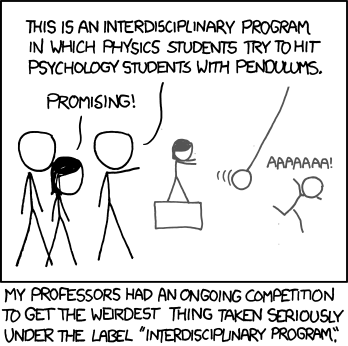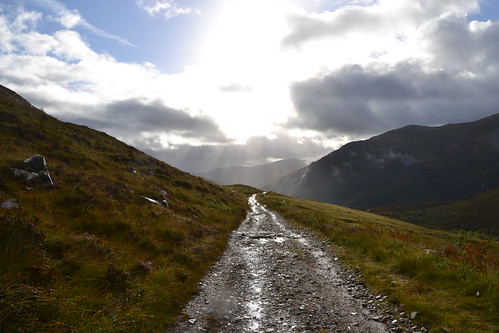Humans are social creatures. We like to feel as if we belong, have a common bond and value set as our peers. And we often do so by putting ourselves in boxes. There are liberals and conservatives. We have national identities, racial identities, religious identities, even dietary identities. In academia, we love it. He's an historian; she's a mathematician; they are economists; we are biologists. It makes it easier. We know how to talk to one another, use the same vocabulary, approach questions in the same way, have the same colleagues and network connections. It's comforting to know what something is; when I see an apple, it's nice to know that it's an apple (and not a grapple...that's just wrong).
But that's not really how the world works. And while we as people may try to fit ourselves into those nice little boxes, as much as we try we just can't address complex, real-world problems that way. The field of conservation biology grapples (not the fruit...) with this challenge on a regular basis, as by its very nature is tasked with addressing complex, real-world problem. So it is observing how this plays out, while participating in the Society for Conservation Biology Oceania conference this week. If you simply looked at the programme or the delegate list, you would see an astounding diversity topics from hard-core ecology to spatial planning to economics. But if you dug a little deeper, started having conversations, or just listened to today's plenary, a dynamic emerges that - while not unexpected - is indicative of the larger shortcomings of tertiary (and perhaps even earlier) aceademic training.
Today's really fantastic plenary speaker (no seriously, I sat rapt through his "not-very-deep history of conservation"), Mark Burgman set a challenge to the "card-carrying social scientists" at the conference and more broadly engaged in conservation to step up their game in terms of the means and methods of getting people to care about conservation, which the ecologists presently lack. But there was a bit of an us versus them cloud descending on the room, which reflects how natural and social scientists are trained to define problems, analyse data, and develop solutions. And therein lies the challenge, in my humble opinion: we approach conservation in an interdisciplinary fashion, bringing together the ecologists and the economists, the anthropologists and astrophysicists (hey, they're good at maths and modeling!) and expect to fluidly join expertise to answer burning questions. But what we are actually missing are the transdisciplinarians who have the background to be able to translate and mediate across different disciplinarian methods, yes, but also ingrained ways of seeing the world (and to give credit where it's due, this was a mutual point in a conversation yesterday post-conference).
Today's really fantastic plenary speaker (no seriously, I sat rapt through his "not-very-deep history of conservation"), Mark Burgman set a challenge to the "card-carrying social scientists" at the conference and more broadly engaged in conservation to step up their game in terms of the means and methods of getting people to care about conservation, which the ecologists presently lack. But there was a bit of an us versus them cloud descending on the room, which reflects how natural and social scientists are trained to define problems, analyse data, and develop solutions. And therein lies the challenge, in my humble opinion: we approach conservation in an interdisciplinary fashion, bringing together the ecologists and the economists, the anthropologists and astrophysicists (hey, they're good at maths and modeling!) and expect to fluidly join expertise to answer burning questions. But what we are actually missing are the transdisciplinarians who have the background to be able to translate and mediate across different disciplinarian methods, yes, but also ingrained ways of seeing the world (and to give credit where it's due, this was a mutual point in a conversation yesterday post-conference).
So this brings me back to identity, because all this thinking has perhaps clarified my own struggle with disciplinary identity and explained (...or rationalised?) my seemingly meandering academic training to date. When asked 'what is your background', I often resort to identifying as a lapsed ecologist. But to be honest, I'm not and never have been. Sure, Earth Systems - Biosphere majors spent a fair amount of time studying ecology (the 'fuzzy' natural science), yet also took classes in economics, anthropology, and even the odd course in history or psychology. The differences emerge in part because of the questions we try to answer: ecologists seek to understand the interactions between plants, animals, and abiotic factors, whereas Earth Systemsers ask how we can use knowledge of ecosysems, as well as the socio-economic contexts in which they are situated, to solve pressing environmental problems. But I would argue it goes even further to keeping an open-mind, not diminishing or invalidating a discipline's approaches (most likely because we don't understand the underlying theory and reasoning), and embracing the wealth of methodologies and existing knowledge at our fingertips when we work together.
I'm not arguing for the end of specialists or disciplines, but we do need to put more weight in training people across disciplines to translate and mediate. Going back to blog posts from ten years ago (which were admittedly a bit mundane and poorly written) the references to this type of undergraduate training were there, although perhaps not fully appreciated at the time. It's increasingly important that training across disciplines be encouraged, while at the same time, those who gravitate towards a particular field of study also must work to be at eye-level with other disciplines (i.e be more accepting and not scoff at the credibility and reliability of each other's practices). If this conference is any indication, it's still a long road, but at least we've begun!
I'm not arguing for the end of specialists or disciplines, but we do need to put more weight in training people across disciplines to translate and mediate. Going back to blog posts from ten years ago (which were admittedly a bit mundane and poorly written) the references to this type of undergraduate training were there, although perhaps not fully appreciated at the time. It's increasingly important that training across disciplines be encouraged, while at the same time, those who gravitate towards a particular field of study also must work to be at eye-level with other disciplines (i.e be more accepting and not scoff at the credibility and reliability of each other's practices). If this conference is any indication, it's still a long road, but at least we've begun!
Read More:
Why Interdisciplinary Research Matters (Nature 2015)
Sustainability Science is a New Academic Discipline. But is it sustainable? (The Conversation 2015)
Preparing for an Interdisciplinary Future (Futures 2013)
Sustainability Science is a New Academic Discipline. But is it sustainable? (The Conversation 2015)
Preparing for an Interdisciplinary Future (Futures 2013)


No comments:
Post a Comment